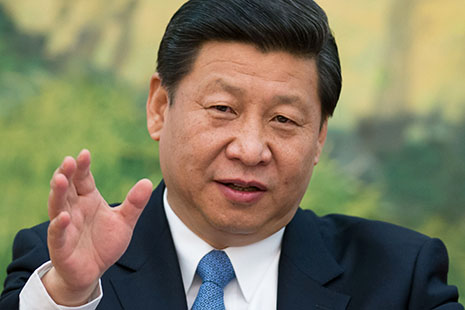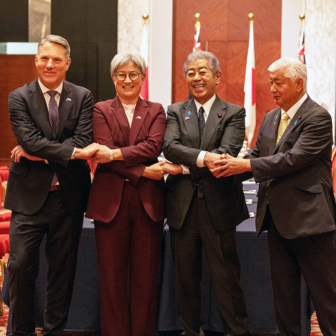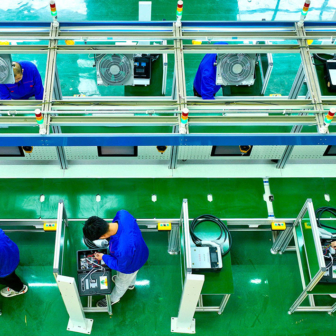SHORTLY after his anointment as party secretary last year, Xi Jinping led the entire Politburo Standing Committee on a tour of The Road of Rejuvenation exhibition at the National Museum in Beijing. It was there, standing in front of haunting images of past humiliation and the military and economic might of China’s recent rise, that he promised to pursue “the China dream.”
“Everybody has their own ideals, pursuits and dreams,” he said. “I personally believe that achieving the great revival of the Chinese race is the mightiest dream of the Chinese nation today.”
The exhibition, which was completed in 2009 to celebrate the ninetieth anniversary of the People’s Republic of China, tells the epic tale of China’s decline and dismemberment at the hands of foreign forces and the struggle of the Communist-led people to reclaim their national pride, dignity and power.
“The severity of misery the Chinese nation has suffered and the enormity of scarifies it has made in modern times are scarcely matched in the world,” Xi pointed out. “After more than 170 years of continuous struggle since the Opium War, however, the Chinese people are finally in control of their own destiny and hard at work in the greatest development drive the world has ever seen.”
Modern Chinese leaders from Sun Yatsen to Xi have sought to define their leadership through a serious of often anodyne slogans, and the China dream is the latest to join the arsenal. As Xi continued speaking, the China dream seemed to take on a distinctly jingoistic tone. “Today we are closer than ever to the goal of achieving the Chinese race’s great rejuvenation,” he told his fellow party leaders, “and are more confident than ever that we have what it takes to succeed.”
The day I visited the exhibition, hundreds of military officers were carefully examining maps of “lost territories” and seized Japanese weapons, while others were absorbed by the “Two Bombs, One Satellite” diorama, which celebrates the detonation of the atomic and hydrogen bombs and a successful missile launch at a time when millions were suffering the horrors of the Cultural Revolution.
The phrase itself, the China dream, was the title of a controversial 2009 book by Liu Mingfu, a colonel in the People’s Liberation Army. Initially banned for its bellicose statements about overcoming American hegemony and assuming global supremacy, the book was republished following Xi’s museum visit, and can now be found at my local Xinhua Bookstore, prominently displayed beside a collection of essays on the China dream issued by the Propaganda Bureau.
With its call for the revival of a spartan, martial spirit, the book echoes the new leadership’s crackdown on corruption and lavish living among Party members. The military (and its “princeling generals” in particular) are key supporters and advisors of Xi, and China’s more assertive foreign policy reflects the moralistic nationalism at the core of his statist vision.
The party’s ongoing austerity campaign – outlined in the Politburo’s “eight-point regulation,” which aims to improve “work styles” – is reminiscent of the Maoist “mass line,” in which slogans like “from the masses, to the masses” sought to keep the party more firmly in touch with its core constituency and their desires.
In that tradition – and in contrast to its American counterpart – party leaders and publications argue that the China dream is a collective enterprise. “The China dream asserts that ‘if it’s good for the country, it’s good for the nation, and everyone benefits,’” argued a People’s Daily editorial earlier this year. “This continues the cultural tradition of Eastern collectivism which believes that a big and powerful country safeguards the happiness of the people and allows everyone to share in the benefits of state development.” A front-page editorial in the same newspaper on 1 April returned to the theme: “Individual dreams and state dreams are mutually related.”
There lies the unstable paradox at the heart of Xi’s new political maxim. Whose dream matters most, the party’s or the people’s? The polysemic quality of Chinese characters means zhongguo meng can be translated as both “the China dream” and “Chinese dreams.”
On Weibo, a Chinese version of Twitter, individual “netizens” are rigorously debating the new buzzword and their own dreams and nightmares for the future. In response to a post on rising inflation and new taxes on small enterprises, for instance, media personality-cum-tech CEO Wang Lifen recently tweeted, “This new government hasn’t a hope of winning the confidence of private enterprises; the China dream is a joke.” “Only leaders have dreams,” another netizen wrote, “we don’t even have the rights to dream.”
But there are many others who embrace the party’s push for Chinese wealth and power at home and abroad. For young soldiers and nationalists alike, strong Party’s rule is the bedrock for their dream of asserting Chinese sovereignty over Tibet, Xinjiang and the uninhabited islands of the South and East China seas.
Yet others simply dream about cashing in. After acquiring the franchise rights to the hugely popular American Idol, Shanghai-based Dragon TV named its new version The Voice of the China Dream. It will air in prime time next month with a cast of celebrity judges and Ford Motors sponsorship. How long before we start seeing “China dream” t-shirts for sale?
The party–state remains vigilant, however, policing its national brand with its considerable resources – as the Guangzhou-based satirist Xu Lin found when his own China dream song was deleted from popular video sharing websites. There isn’t much room in Xi’s vision for sentiments like: “The Chinese dream isn’t one of dictatorship or authoritarian government… [It is] the people’s dream, a dream of democracy and constitutional government.”
In evoking the China dream, Xi Jinping has created a powerful vehicle for grassroots mobilisation. But does the party still possess the legitimacy and capacity to guide whatever comes out of this Pandora’s box of pent-up desires, frustrations and fears?
Xi’s predecessor, Hu Jintao, first spoke of “China’s peaceful rise” and then “harmonious society” before settling on the more equivocal “scientific outlook on development.” Xi’s administration is still finding its feet and voice, so it’s too early to tell whether “the China dream” will come to define the next decade of Communist rule or fizzle out in a similar way.
Xi, a more relaxed and confident patriot who views his princeling pedigree as a mandate to rule, is clearly cut from a different jib from his predecessors. Yet, like Hu, he is also risk-averse, a man whose top priority is the preservation of Communist wealth and power. Xi might still initiate much needed reform, but continued Party rule remains central to his China dream, and the people’s dreams will be confined to their bedrooms. •




